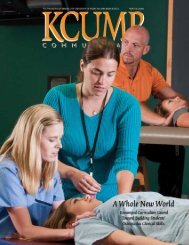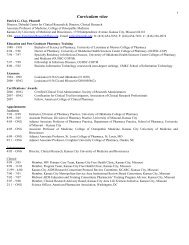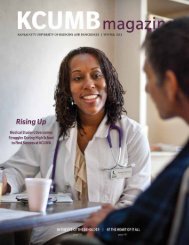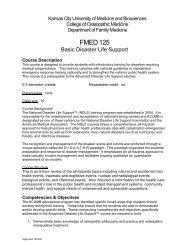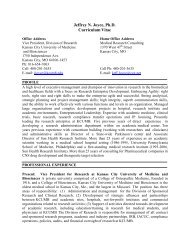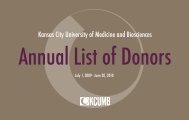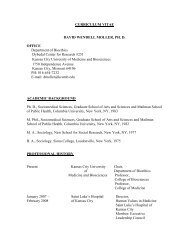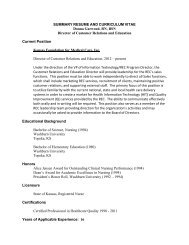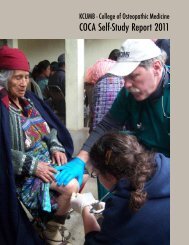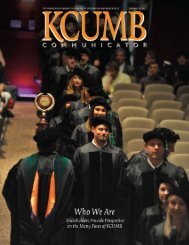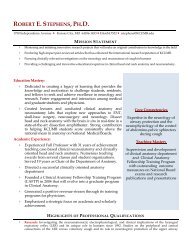news - Kansas City University of Medicine and Biosciences
news - Kansas City University of Medicine and Biosciences
news - Kansas City University of Medicine and Biosciences
- No tags were found...
You also want an ePaper? Increase the reach of your titles
YUMPU automatically turns print PDFs into web optimized ePapers that Google loves.
Medical errors are a serious public health problem.• In 1999, the Institute <strong>of</strong> <strong>Medicine</strong> releasedwhat was then shocking <strong>news</strong>: Each year, about98,000 people in the United States die from “adverseevents” caused by hospital errors. Patients suffering injuryfrom these events could number another 1 million.• In 2011, a study published in Health Affairs indicatedthat when people enter the hospital they face a one-inthreechance <strong>of</strong> experiencing an adverse event. It als<strong>of</strong>ound that some 90 percent <strong>of</strong> mistakes occurring inhospitals are never reported.To put all this in perspective, a 2010 survey <strong>of</strong> institutionsregistered with the American Hospital Association showedtotal admissions <strong>of</strong> about 36,915,331 patients annually. Ifa third <strong>of</strong> these patients experience an adverse event, thatwould be 12,305,110 injuries caused by medical mistakes.The Institute for Healthcare Improvement estimates that morethan 40,000 instances <strong>of</strong> medical harm happen every day.So what is the solution? Is it better training in the mechanics<strong>of</strong> medicine to prevent infection or ensure that theright pill goes to the right patient? Is it tougher sanctionsfor pr<strong>of</strong>essionals who commit the errors?Will these approaches or others along the same linesmake any difference as long as there is a strong tendencytoward leaving errors unreported or even covering them up?“Physicians have an ethical <strong>and</strong> moral responsibility totake ownership <strong>of</strong> their errors,” said David Moller, Ph.D.,pr<strong>of</strong>essor <strong>and</strong> chair <strong>of</strong> bioethics.But too many major medical errors are never revealedbecause physicians fear damage to their careers or theyclose ranks to protect each other. It is a situation that isbad for physicians, the medical community as a whole <strong>and</strong>patients. And it does not have to be this way.“There’s a natural tendency to curl up in a fetal positionWhoops! Medical Mistakes:How to Make Things RightWhen They Go WrongStory by Christopher Ryan<strong>and</strong> pray it all goes unnoticed,” said Sarah Parrott, D.O.,assistant pr<strong>of</strong>essor <strong>of</strong> family medicine at KCUMB <strong>and</strong> coordinator<strong>of</strong> the communications component for the osteopathicclinical skills program. “Instead, we need to partner withthe patient or family to see to it that it never happens again.”How can physicians partner with patients who have justsuffered physical or psychological injury while in their care?How is it possible to have that kind <strong>of</strong> relationship undersuch difficult circumstances?It might not be possible all the time, but it can be mademore likely. There is a growing consensus – at least amongthe faculty <strong>and</strong> students at KCUMB – that there is a way toprevent, manage <strong>and</strong> learn from medical mistakes, <strong>and</strong> it ismore in the “s<strong>of</strong>tware” <strong>of</strong> medicine than the “hardware.”A S<strong>of</strong>t Approach to a Hard ProblemThe answer to the plague <strong>of</strong> medical errors is quitestraightforward, Dr. Moller said. It can best be related inthree words: “Communication, communication, communication.”Whatever else might be part <strong>of</strong> an attempt to reducemistakes, it will not advance the cause very far without opencommunication from beginning to end.It might sound easy enough, but it is not. Communicationis key at every point in the ongoing struggle againstpreventable mistakes. It must be there when hospitals <strong>and</strong>doctors’ <strong>of</strong>fices set up plans for preventing <strong>and</strong> managingerrors. It is a fundamental requirement <strong>of</strong> every interactionwith patients. It remains critically important when mistakeshappen so they are less likely to happen again.Communication even has the potential to make the difficulttask <strong>of</strong> informing a patient that an error has occurredless traumatic.“Patients are the ultimate judges <strong>of</strong> whether we’regood physicians,” Dr. Parrott said, pointing out that eventhe smartest physician on the planet cannot do the job wellwithout communication. “Somehow, we have to communicateall the knowledge we’ve gathered, <strong>and</strong> continue togather, to our patients if we’re to do them any good.”“Empathy <strong>and</strong> compassion are critically important,” Dr.Moller said. “The more they’re displayed, the more patientswill become trusting <strong>and</strong> compliant with directives, <strong>and</strong>they’ll be more likely to have a good outcome. In the case <strong>of</strong>a mistake, patients are more likely to be forgiving.”Communication is essential to a close relationship betweenphysicians <strong>and</strong> their patients, but also their patients’families. So, when the knowledge that must be passed onconcerns a medical error, previous successful communicationcan play a major positive role, even if the error hasresulted in a death.“I think families want to know their loved one wasn’thurt or permanently injured for nothing <strong>and</strong> that it will leadto a change in the system so it won’t happen to someoneelse,” Dr. Parrott said.If family members have a close bond with the physician<strong>and</strong> believe a thorough explanation <strong>of</strong> the error has beenmade, they are much less likely to take legal action, she said.How to Admit an ErrorEveryone makes mistakes. Physicians’ mistakes cancause serious harm. Although good communication canmitigate the consequences <strong>of</strong> error, they still can be severefor physicians, both emotionally <strong>and</strong> financially. The effecton a physician’s medical career can be devastating.All that said, it is vital that errors be reported, investigated,resolved <strong>and</strong> used to learn <strong>and</strong> improve. The hardestpart is reporting the mistake, especially if it has causedinjury or death.Planning for errors can help. Dr. Parrott suggests thatboth hospitals <strong>and</strong> physicians’ practices refer to the Institutefor Healthcare Improvement’s white paper, “RespectfulManagement <strong>of</strong> Serious Clinical Adverse Events,” which isavailable on the organization’s website, www.IHI.org. Thepaper provides step-by-step assistance in developing a crisismanagement plan.Dr. Parrott also has suggestions <strong>of</strong> her own for physicianswho find themselves talking with a family about amedical error that has affected their loved one.“In case <strong>of</strong> harmful error, the attending physician needsto meet with the family in a quiet room as soon as possible,”she said.If desired, a spiritual advisor should be present. Thephysician should explain exactly what happened <strong>and</strong> let thefamily know that all parties involved are sorry the mistakeoccurred. The physician also should make it clear that theincident will be investigated.Individual crisis management plans might vary in approachsomewhat, but Dr. Parrott believes transparency from the outsetis extremely important. She adds that, should the familybring an attorney to the meeting, it is perfectly reasonablefor the physician to have representation present.Once the error has been reported <strong>and</strong> discussed withthe family, follow-up is critical. The incident should bethoroughly investigated – not with the focus on punishingsomeone, but with an eye toward learning <strong>and</strong> avoidingthe same problem in the future. The goal is continuousimprovement in the delivery <strong>of</strong> care, <strong>and</strong> it is not possiblewithout ongoing, open communication.Little Lapses Can Mean Big ProblemsHeidi Denton, D.O. (COM ’12), M.A. (COB ’12), graduatedfrom KCUMB in May. She saw communication failuresfirsth<strong>and</strong> during her clerkships, failures she credits herbioethics degree with helping her to recognize more easily.In one instance, a nurse called a patient advocate to tellhim that surgery on his patient, who had mental deficits,had been successful. The advocate had no idea the surgeryhad been done. He had been waiting to learn when it wouldbe scheduled.Another time, Dr. Denton was present when a patientwho could not speak or read English was asked to signa form allowing a blood test. There was no translator or anyoneelse who could help the woman underst<strong>and</strong> what shewas agreeing to. She finally gave in <strong>and</strong> signed.Neither <strong>of</strong> these examples would be likely to result ininjury or death, but both were psychologically traumatizing.Continued on page 1816 Summer 2012 KCUMB CommunicatorSummer 2012 KCUMB Communicator 17




